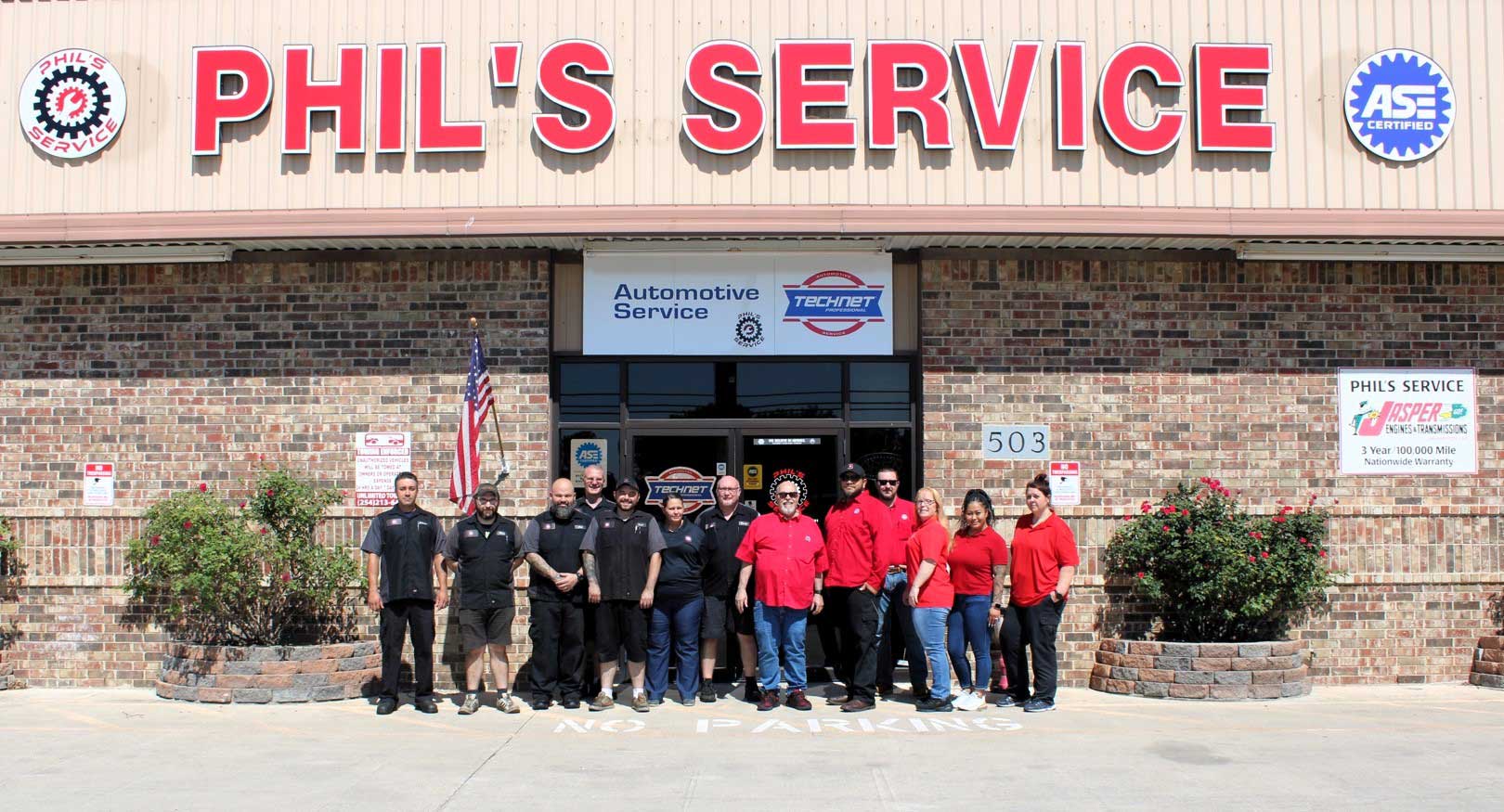Like any mechanical part in your car, power steering pumps can struggle over time. That can lead to significant issues impacting your vehicle's handling and safety. But how do you know what's causing your car issues?
We've got the 411.
Let's go through all the signs of a failing power steering pump.
Squealing Sounds
If you hear a squealing noise, specifically when you're turning the steering wheel, it could indicate a problem with the power steering pump.
This noise often occurs due to increased strain on the pump when turning, especially at low speeds or when the system is under stress.
Another common sign is a squealing noise when starting the engine. This could be related to a loose or worn power steering pump belt.
The belt may slip or produce noise when starting the engine or when the steering system is engaged. If you're seeing any of these issues, head to an auto repair service near you.
Wheels Slipping
Wheels slipping isn't the most common sign of a steering wheel issue, but it does happen. When a power steering pump fails, it typically results in difficulty steering or a lack of power assistance when turning the steering wheel.
If the power steering pump fails suddenly, causing a loss of hydraulic pressure or fluid, the wheels could slip, especially if you're trying to turn the steering wheel sharply while the pump is struggling to provide adequate power assistance.
Difficulty Turning the Steering Wheel
Difficulty turning the steering wheel is a common sign of a failing power steering pump. The pump provides hydraulic assistance to make steering easier, especially at low speeds and when making sharp turns.
When your power steering pump begins to show signs of failure, it can result in increased resistance when turning the steering wheel, making it harder for the driver to maneuver their car.
One of the most noticeable signs is that the steering wheel feels stiff or heavy, requiring more effort to turn, especially when the vehicle is stationary or moving slowly.
As the power steering pump loses efficiency, you may experience a jerky or uneven steering response, where the wheel feels harder to turn in some spots and easier in others.
The power assistance may work intermittently, sometimes providing assistance and other times feeling stiff or heavy, which can be a sign of an inconsistent pump performance.
To prevent these issues, look into car maintenance options in your area.
Belt Slippage or Wear
A slipping belt can be a major sign of problems with your power steering pump. The power steering pump in your car is driven by a belt that connects to your engine's crankshaft.
Over time, the belt can get beat up or become loose, especially if the tensioner that maintains proper belt tension is failing.
Inspect the power steering pump belt for visible problems. These might include cracks, fraying, or glazing. A worn-out or damaged belt is more prone to slipping on the pulleys, impacting the operation of the power steering system.
Fluid Problems
One of the most common signs of a failing power steering pump is seeing power steering fluid leaks under your vehicle.
Leaks can spring up because of seals, hoses, or a damaged pump itself. You may notice puddles of reddish or brownish fluid where your car is parked.
If you frequently find yourself needing to top up the power steering fluid reservoir or if the fluid level keeps dropping without any visible leaks, it could indicate a problem with the power steering pump. A failing pump may not be able to maintain proper fluid pressure, leading to significant fluid loss.
Power steering fluid should be clean and free of debris or contaminants. If you observe that the fluid is dirty, discolored, or contaminated, it could signal a problem with the power steering pump or other components.
Contaminated fluid is a significant problem. It can increase wear on pump components and reduce the power steering system's overall efficiency.
When air enters the power steering system, it can cause the fluid to become foamy or aerated. This can occur due to leaks, low fluid levels, or internal pump issues.
Foamy fluid can reduce the effectiveness of power steering assistance and may contribute to abnormal noises during steering, such as whining or groaning sounds.
A failing power steering pump may struggle to maintain proper fluid circulation and cooling. This can lead to fluid overheating, which can cause damage to the pump and other components in the power steering system.
Overheated fluid may appear darker in color and can contribute to accelerated wear and tear on your vehicle.
Steering Vibration issues
If you experience vibrations or shaking in the steering wheel when turning, especially at low speeds or during maneuvers, it could be a sign of a failing power steering pump. The vibration may occur due to uneven hydraulic pressure or instability within the pump, leading to steering inconsistencies.
Power steering issues can lead to uneven tire wear, such as cupping or scalloping. Uneven tire wear can cause steering vibrations, especially at higher speeds, as the tires encounter variations in the road surface.
Groaning Noises
Over time, the internal components of the power steering pump can get messed up. This can include issues with the pump's bearings, seals, or internal gears. When these components wear out, they can create friction and cause the pump to produce groaning or whining noises during operation.
In some cases, a failing power steering pump may create excessive pressure within the system. This can lead to increased noise levels, including groaning sounds, as the pump struggles to maintain proper pressure and fluid flow.
Catch a Failing Power Steering Pump Today
Now that you know the signs of a failing power steering pump, you'll be able to get your car to auto services before it's too late.
Are you searching for regular car maintenance and repair services in Killeen?
Phil's Service is home to tons of certified professionals along with state-of-the-art technology.
Contact us today.
Wondering what Are the Signs of a Failing Power Steering Pump? Call Phil's Service for more information about car maintenance.
Like any mechanical part in your car, power steering pumps can struggle over time. That can lead to significant issues impacting your vehicle's handling and safety. But how do you know what's causing your car issues?
We've got the 411.
Let's go through all the signs of a failing power steering pump.
Squealing Sounds
If you hear a squealing noise, specifically when you're turning the steering wheel, it could indicate a problem with the power steering pump.
This noise often occurs due to increased strain on the pump when turning, especially at low speeds or when the system is under stress.
Another common sign is a squealing noise when starting the engine. This could be related to a loose or worn power steering pump belt.
The belt may slip or produce noise when starting the engine or when the steering system is engaged. If you're seeing any of these issues, head to an auto repair service near you.
Wheels Slipping
Wheels slipping isn't the most common sign of a steering wheel issue, but it does happen. When a power steering pump fails, it typically results in difficulty steering or a lack of power assistance when turning the steering wheel.
If the power steering pump fails suddenly, causing a loss of hydraulic pressure or fluid, the wheels could slip, especially if you're trying to turn the steering wheel sharply while the pump is struggling to provide adequate power assistance.
Difficulty Turning the Steering Wheel
Difficulty turning the steering wheel is a common sign of a failing power steering pump. The pump provides hydraulic assistance to make steering easier, especially at low speeds and when making sharp turns.
When your power steering pump begins to show signs of failure, it can result in increased resistance when turning the steering wheel, making it harder for the driver to maneuver their car.
One of the most noticeable signs is that the steering wheel feels stiff or heavy, requiring more effort to turn, especially when the vehicle is stationary or moving slowly.
As the power steering pump loses efficiency, you may experience a jerky or uneven steering response, where the wheel feels harder to turn in some spots and easier in others.
The power assistance may work intermittently, sometimes providing assistance and other times feeling stiff or heavy, which can be a sign of an inconsistent pump performance.
To prevent these issues, look into car maintenance options in your area.
Belt Slippage or Wear
A slipping belt can be a major sign of problems with your power steering pump. The power steering pump in your car is driven by a belt that connects to your engine's crankshaft.
Over time, the belt can get beat up or become loose, especially if the tensioner that maintains proper belt tension is failing.
Inspect the power steering pump belt for visible problems. These might include cracks, fraying, or glazing. A worn-out or damaged belt is more prone to slipping on the pulleys, impacting the operation of the power steering system.
Fluid Problems
One of the most common signs of a failing power steering pump is seeing power steering fluid leaks under your vehicle.
Leaks can spring up because of seals, hoses, or a damaged pump itself. You may notice puddles of reddish or brownish fluid where your car is parked.
If you frequently find yourself needing to top up the power steering fluid reservoir or if the fluid level keeps dropping without any visible leaks, it could indicate a problem with the power steering pump. A failing pump may not be able to maintain proper fluid pressure, leading to significant fluid loss.
Power steering fluid should be clean and free of debris or contaminants. If you observe that the fluid is dirty, discolored, or contaminated, it could signal a problem with the power steering pump or other components.
Contaminated fluid is a significant problem. It can increase wear on pump components and reduce the power steering system's overall efficiency.
When air enters the power steering system, it can cause the fluid to become foamy or aerated. This can occur due to leaks, low fluid levels, or internal pump issues.
Foamy fluid can reduce the effectiveness of power steering assistance and may contribute to abnormal noises during steering, such as whining or groaning sounds.
A failing power steering pump may struggle to maintain proper fluid circulation and cooling. This can lead to fluid overheating, which can cause damage to the pump and other components in the power steering system.
Overheated fluid may appear darker in color and can contribute to accelerated wear and tear on your vehicle.
Steering Vibration issues
If you experience vibrations or shaking in the steering wheel when turning, especially at low speeds or during maneuvers, it could be a sign of a failing power steering pump. The vibration may occur due to uneven hydraulic pressure or instability within the pump, leading to steering inconsistencies.
Power steering issues can lead to uneven tire wear, such as cupping or scalloping. Uneven tire wear can cause steering vibrations, especially at higher speeds, as the tires encounter variations in the road surface.
Groaning Noises
Over time, the internal components of the power steering pump can get messed up. This can include issues with the pump's bearings, seals, or internal gears. When these components wear out, they can create friction and cause the pump to produce groaning or whining noises during operation.
In some cases, a failing power steering pump may create excessive pressure within the system. This can lead to increased noise levels, including groaning sounds, as the pump struggles to maintain proper pressure and fluid flow.
Catch a Failing Power Steering Pump Today
Now that you know the signs of a failing power steering pump, you'll be able to get your car to auto services before it's too late.
Are you searching for regular car maintenance and repair services in Killeen?
Phil's Service is home to tons of certified professionals along with state-of-the-art technology.
Contact us today.


